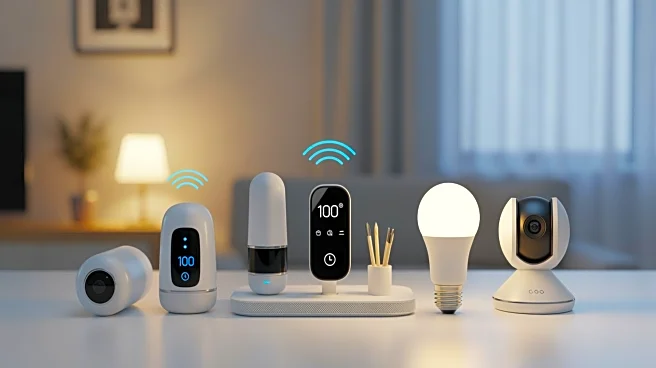What's Happening?
Home automation is revolutionizing the way people interact with their living spaces by integrating smart technologies to automate various household functions. This system connects devices such as lights,
thermostats, appliances, and security systems, allowing them to communicate wirelessly and be controlled remotely. The technology is designed to enhance comfort, security, convenience, and energy efficiency. Home automation systems can be installed in new homes or retrofitted into existing ones, offering flexibility in design and functionality. The systems can operate through centralized, distributed, or mixed architectures, providing options for different user needs. Devices connected to these systems can be programmed to perform specific tasks or respond automatically to environmental changes, such as adjusting lighting based on natural light availability or activating security systems in response to detected intrusions.
Why It's Important?
The adoption of home automation systems is significant as it represents a shift towards more sustainable and efficient living environments. By optimizing energy use, these systems contribute to eco-sustainability and can lead to substantial cost savings on utility bills. They also enhance the quality of life by providing convenience and security, allowing homeowners to manage their homes more effectively. The integration of smart technologies in homes is part of a broader trend towards smart cities and the Internet of Things (IoT), which aims to create interconnected environments that improve urban living. As more consumers adopt these technologies, there is potential for significant impacts on energy consumption patterns and the development of new business models in the tech and home improvement industries.
What's Next?
As home automation technology continues to evolve, we can expect further integration with renewable energy sources and advancements in AI to enhance system capabilities. The market for smart home devices is likely to expand, with increased compatibility and interoperability among different brands and systems. This growth will be driven by consumer demand for more personalized and efficient home environments. Additionally, as the technology becomes more accessible, there may be increased focus on addressing security and privacy concerns associated with connected devices. Industry stakeholders, including tech companies and policymakers, will need to collaborate to establish standards and regulations that ensure the safe and effective use of home automation technologies.
Beyond the Headlines
The rise of home automation also raises ethical and cultural questions about privacy and data security. As these systems collect and analyze data to optimize home functions, there is a need to ensure that personal information is protected from unauthorized access. The cultural shift towards automated living may also impact traditional notions of home and family life, as technology becomes more integrated into daily routines. Furthermore, the widespread adoption of these systems could exacerbate the digital divide, as not all households may have equal access to the benefits of smart home technologies.










